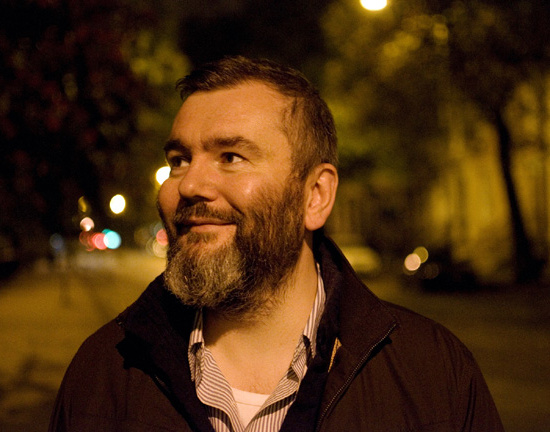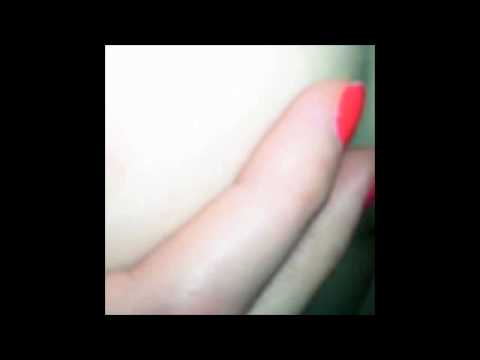There are certain songs that, since we started the Quietus nearly five years ago, have become oddly reassuring themes for the site. One of those tracks is L. Pierre’s ‘Jim Dodge Dines At The Penguin Cafe’, seven minutes of sunny, lilting tropical horns that have guided us through many a bleak moment.
Now, Aidan Moffat (for L. Pierre is he) returns with The Island Come True, which takes the lo-fi crackle and warm evocations of his previous output into darker territories. Moffat tells us that earlier L. Pierre records were inspired by "10p charity shop records… I loved taking these unwanted and fairly atrocious records and making something darker and hopefully prettier out of them." Listening to these albums, there’s a melancholy that suggests you’re hearing the tale of the end of the life of someone who just joined the great majority, leaving a distant relative to drop their record collection off at Oxfam.
This time, Moffat says he was influenced by the music of the Erased Tapes label, the composer Arvo Pärt and itinerant New Yorker Moondog, as well as Lewis Carroll, J.M. Barrie, and David Lynch. But first, back through time to the early years of L Pierre…
Can you tell us about how L. Pierre started?
Aidan Moffat: When I first started Lucky Pierre in the late 90s, Arab Strap were working with samples for the first time – I think it was the ‘Afternoon Soaps’ single – with an engineer called Calum Maclean. I really enjoyed working with him and using samples and electronic parts, which is something I’d never really tried before, so I went back on my own with some ideas – this was when I had a lot of disposable income and musicians actually made money, so I could afford to pay for a couple of days in a professional studio! – and the first 7" came from those first sessions.
I met David Cooper who was just starting up the Melodic label in Manchester. He said he was really into to doing an album, so I finished Hypnogogia (and deliberately misspelled the title), which was really my own personal comedown mix. I’ve always had trouble sleeping, but I was taking a rather excessive amount of happy pills at the time and it really exacerbated the insomnia, obviously, so I tried to make an album that would help me sleep, or at least point me in the right direction.
The next album, Touchpool, was much different – that was an attempt to do a sort of lounge record. I was really getting into the bargain basement easy listening sounds I found on 10p charity shop records, so it mostly came from that.
‘Lucky Pierre’ has fairly dirty origins. Why did you call the project after that? Can’t keep it down eh?
AM: Aye, I thought it was funny at the time. I was younger and more easily amused then, but I started to regret it after the first album. It turned out there were at least three bands in America called Lucky Pierre or The Lucky Pierres, and I decided I couldn’t be bothered with it anymore. One of those bands was – and maybe still is – a gay punk band, and I realised the name was far more perfect for them than my moody, samply chill-out tunes, so I abbreviated it to L. Pierre from the second album onwards. I thought that sounded a bit classier, at least.
Now, correct me if I’m wrong, but I’m sure you told me you weren’t going to do any more L. Pierre. Why the decision to do it now?
AM: I wasn’t going to, I had absolutely no intention of doing another one because I was so pleased with the last one, Dip. I thought I’d gone as far as I could, and I’d completely written L. Pierre off.
But then in late 2011 I was looking through some boxes and I found loads of CDs with samples I’d collected, and I just started messing about for fun, and the next thing I know I’m sending new ideas to Dave at Melodic again. I ended up ditching most of the sample stuff though and got more into old film clips and public domain stuff. ‘Now Listen!’ for instance, that’s from an old advert (I can’t remember what for) and the ‘Tulpa’ speech was cut up from a seance scene in some old public domain haunted house film that nobody wants to watch. Anyway, to answer your question, it happened by accident; it was probably the direct result of being a bit bored in between working on songs and doing gigs with Bill Wells.
There’s the sound of seagulls and so on. Did you do your own field recordings for this?
AM: I did some of them, yes, but one or two were found online and taken from old movies. I don’t even remember which ones, to be honest. The child on ‘Sad Laugh’ is my son, though, I remember that well – we were playing around with an old dictaphone and for some reason he picked up his cuddly, plush radio and turned it on, and I’ve no idea what channel it was or anything, but this sinister choral music came out and I just recorded it then for fun. I really enjoy using those happy accidents – the sound of serendipity!
How about the music? You’ve recently worked with Bill Wells, The Best Ofs, often your own music is a lot more sparse than this. How did you put it together?
AM: I did most of it at home, late at night – after I decided to make an album, I got a little obsessed with it and must have sent at least ten different versions to Dave. The track ‘Exits’, for instance, was a very last minute addition that I used to replace something else which got completely scrapped. I’d probably still be working on it now, but it’s always best to put a time limit on things you work on at home. I think that’s why it ended up being a bit more mysterious and sinister than the other records, because I only ever worked on it between 9pm and 3am when my son and his mum had gone to bed. It seems quite claustrophobic to me, and that’s because it was all made in one room at home with my face stuck in the computer for hours.
Which side of Aidan Moffat is L. Pierre?
AM: The insomniac, slightly frightened side, probably. I’m not really sure how to answer that though, it seems as natural to me as the lyrical records; it’s exactly the record I expect me to make, you know?
It sounds pretty lo-fi too. Was that deliberate to get that sense of space in there with tracks like ‘Sad Laugh’? How about the vinyl crackle?
AM: Aye, I wanted it all to sound rough and worn, and I added a great deal of the vinyl crackle and surface noise myself. It came from watching those old films that a lot of the sounds came from – I loved listening to the really disintegrated recordings and still hearing something lovely poke through. It sounded as though they’d lived a long and full life but still retained their beauty after taking a horrendous beating or being treated like shit; they sound kind of invincible and dignified and vulnerable all at once. And there’s a nice balance of sadness and optimism that really appeals to me in that sound, so I amplified it and created some of my own.
Is it more of a challenge for you to make instrumental albums? Do you find yourself starting to mumble lyrics over the top?
AM: Ha, no! L. Pierre’s a very separate thing in that sense, it’s designed to have a different function, so the temptation’s never there, no. I don’t find it more of a challenge but I’m a lot more indecisive when I work on my own. In all honesty, I prefer working with other people, I get a real thrill from creating something in a partnership. It’s certainly more rewarding – and sometimes more challenging – but I think you tend to be more confident as part of a team.
That said, the L. Pierre stuff works well for me because it’s created in the same environment it’s meant to be listened to – it’s really a solitary experience, it’s not like writing songs and telling stories then recording them in a studio with musicians, it’s all about being alone. The L. Pierre music, especially the new one, is open to interpretation, whereas my songs are usually pretty straightforward and unequivocal. The Island Come True was designed to be a kind of blank canvas for the listener, so it’s more like a Choose Your Own Adventure experience than the usual narrative work I do. As a singer, you have more command of the journey, but a record like this is more just like planting the signposts; there’s maybe a story there, but you have to find it for yourself.
What would you do if that lady on the cover of the album asked you for a pina colada and a strum on her little guitar thing?
AM: I’d go straight to the bar. I think it’s a ukulele, by the way!
The track ‘Dr Alucard’… why bring Dracula into tropicalia?
AM: I just thought that tune sounded a bit vampirish. One time I listened to that track, I had a vision of being in a horse-drawn carriage, travelling up the bumpy hill to a scary castle, so I thought I’d stick a vampire reference on it. I remembered ‘Alucard’ from a few Hammer Horror films, but I don’t think there was ever a doctor. But I’m glad you asked that, because it obviously feels a bit wrong to you, which is great and is all part of the interpretation idea. At one point that track was called ‘Car Ad’ because it reminded me of fancy posh motors speeding round mountainsides, but I decided against that because I thought it sounded like a plea.
Are you aware of any other tropical Scottish/Scottish tropical musical projects?
AM: Ha ha, no! Maybe it’ll be the sound of 2013.



